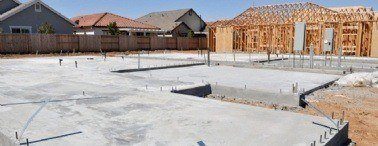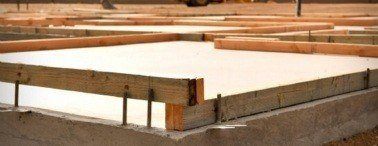
Written by: Haliburton Home & Cottage Directory
If you are building a new home or cottage, or adding an addition to an existing structure, discuss with your builder the different types of foundation possibilities. There are three traditional types to choose from - the concrete block, insulting concrete forms (ICFs) and a permanent wood foundation (PWF).
Whether building on piers, crawlspace or complete basement, the traditional material is concrete block.
- With block walls, the quality of concrete masonry units is controlled by the manufacturer. With poured walls, quality can be influenced by the contractor increasing the amount of water (thus decreasing the concrete strength) and by a number of other environmental factors.
- Concrete masonry walls are installed dry. Poured walls remain damp and wet for some time after installation.
- Block basements add flexibility because they can be fitted around any shape of door and window.
- With concrete masonry units, you are not limited to the size of forms, as in poured concrete walls.
- A basement made with concrete masonry units is less likely to crack than a poured concrete basement because when poured in forms, the concrete will shrink as it dries in natural environmental conditions. The warmer it is during drying, the worse the cracking will be.
Insulating Concrete Forms (ICFs) are hollow foam blocks or panels which are stacked in the shape of building walls. The forms are filled with reinforced concrete - sandwiching a heavy, high-strength material between two layers of light, high-insulation foam. The resulting walls offer many benefits including air tightness, strength, sound attenuation, insulation and fire resistance.
The permanent wood foundation (PWF) is a complete wood frame foundation or crawlspace for low-rise, residential industrial, commercial and other types of buildings. PWF's are built using lumber and plywood, pressure-treated with approved wood preservatives.
PWF's advantages over other types of foundations include:
- In-place framing for easy and economical insulation and finishing.
- Energy savings because of high insulation levels of PWF's (about 20% of heat loss is experienced through the foundation)
- Dry, comfortable living space provided by a superior drainage system.(which does not require weeping tile).
- Increased living space since drywall can be attached directly to foundation wall studs.
- Resistance to damage, such as cracks, from cold weather .
- Adaptable to most building designs, including crawl spaces, additions and walk-out basements.
- Build-able during the winter months using minimal measures around the footings to protect them from freezing.
- Rapid construction, whether framed on site or pre-fabricated off-site.
Ask your builder about all the advantages and disadvantages of all the options available. They have the experience necessary to help you decide the best material to use.
Posted by: TrustedPros




